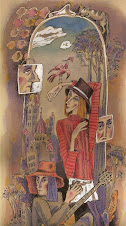Guest column by Juliet Marillier, who was born in
Dunedin, New Zealand, and now lives in Western
Australia. Her historical fantasy novels, including
the best-selling Sevenwaters series, have been
translated into many languages and have won a
number of awards including the American Library
Association’s Alex Award and the Prix Imaginales
(see all books here). Juliet is a member of OBOD
(the Order of Bards, Ovates and Druids). She lives
in a 100-year-old cottage, which she shares with a
pack of waifs and strays. Learn more at her website.
Strange how life imitates art. Since my cancer diagnosis, I’ve felt curiously as if I were living in one of my own books. Each of my novels features a protagonist undertaking a difficult personal journey. On the way, each of these characters—mostly female—discovers something about herself and at the same time makes an impact on other people’s lives. Each eventually finds her inner courage and proves she is able to learn from all her experiences, even the painful and frightening. Facing a similar journey, full of challenges and unknowns, I feel obliged to delve inside myself and find the same combination of wisdom and warrior spirit. What I write, I must be prepared to live.
IN ANY GENRE, CHARACTERIZATION IS KEY
As a novelist, I’m endlessly fascinated by human behavior and interactions. The most satisfying stories are those in which the protagonists change and develop along the way. In many fantasy novels, the emphasis is on world-building and/or keeping the story going at a cracking pace, and depth of characterization can fall by the wayside. The best fantasy—indeed the best fiction in any genre—contains characters so real that they draw us into the heart of their journey. We understand why they make bad choices. We share their secrets. We know their weaknesses and flaws. We applaud when they win small battles, become wiser, confront their demons. We weep when they fail.
There are technical tricks that may help you create more effective characters. My approach to characterization is not at all technical. I can’t really analyze how I do it, but I am sure of one thing. To write convincing characters, you must possess the ability to think yourself into someone else’s skin. I’m not talking about an intellectual exercise, but something more visceral. I don’t know if it can be learned. I believe I’ve acquired it through life experience. The ability to understand what makes people tick comes from within. In your mind, you must be the character in order to make his or her journey real.
TURNING POINT EXERCISE
Test yourself by imagining how you might act, feel, respond in each of the following situations:
* Someone close to you, your child, partner, or parent, is facing torture or summary execution. You can save him or her if you are prepared to betray an old and trusted friend. What physical sensations are you feeling? What is in your mind? What choice will you make? What will this do to your sense of self and your relationships with these people afterward?
* Every day you walk on eggshells to avoid provoking a family member’s abusive behavior. This is the habit of many years. One day something changes in you—you pack a suitcase and leave. That night, in the safety of a friend’s house, you sit in front of the fire alone. What are your physical sensations? What do you see, hear, smell, touch? What is going through your mind? In what ways do you feel different?
* You have always been an independent person, in control of your own life, your beloved house, animals and garden. But you’ve had a stroke, and your children have just moved you to an old people’s home. They’ve unpacked your possessions neatly, had a cup of tea with you and left. What are you doing? How are you feeling? What is the future looking like right now?
Now move on to one of your own characters. First, look at the beginning and end of this character’s journey. Then zoom in on three or four key moments along the way. When is she at her highest? Her lowest? What are the significant turning points? Apply the scenario exercise to each of those, remembering that you are the character. Take a snapshot of your physical, mental and emotional state. The snapshots can provide a blueprint for this character’s development.
Of course, each scenario leads to various possibilities, just as the woman trying on the wigs faces many possible futures. What kind of wig does she choose? The one that is most like her own hair. She needs no additional armor—her warrior spirit is inside.
(A version of this post appeared on Writer Unboxed in 2009. Juliet is currently in good health. Seer of Sevenwaters (Roc, December 2010) was written during her year of cancer treatment.)
by Juliet Marillier
I Left MAGA Host SPEECHLESS on CNN
1 month ago










No comments:
Post a Comment